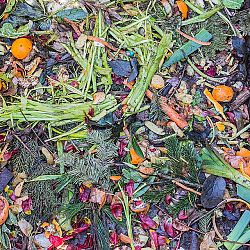

Data released by the Environmental Protection Agency (EPA) on composting and anaerobic digestion for 2016 in Ireland presents an increase for biodegradable waste, the quantity recycled increased by 15% between 2015 and 2016 (from 308,000 tonnes to 353,000 tonnes).
Kitchen and canteen food waste as well as park and garden waste accounted for most of the waste accepted for treatment in 2016, around 65%. Composting of waste was the dominant treatment type as 79 percent of tonnage was accepted.
Under the 2013 Household Food Waste Regulations SI 71/2013, waste collectors are required to provide brown bins for food/organic waste in agglomerations with a population greater than 500 people to ensure that the waste food is collected separately, which then enables composting or anaerobic digestion.
In 2016 alone around 174,000 tonnes of brown bin waste were accepted at composting and anaerobic digestion facilities for treatment, an increase of 22%, and 12% more households owned an organic bin compared with 2015, another positive outcome that is the benefit of the implementation of the 2013 Household Food Waste Regulations SI 71/2013.
Stephen Treacy from the EPA concluded by explaining the co-benefits of anaerobic digestion: "Anaerobic digestion extracts additional value from organic waste due to the possibility of using the captured biogas. This not only mitigates the effect on climate change but the biogas can displace fossil fuel use, increasing the amount of renewables being used in Ireland."
Are you wondering why we're discussing legislation in the Republic of Ireland? Watch this space...